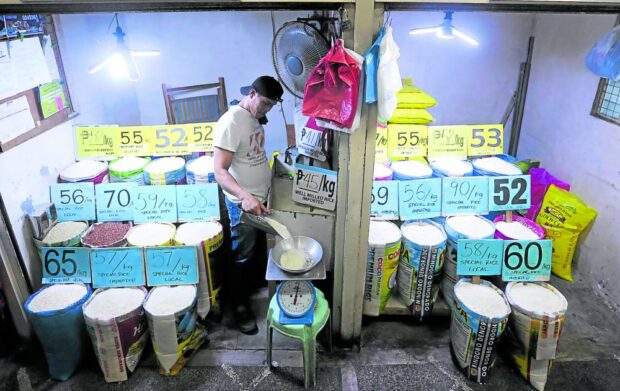
CHEAPER RICE | A vendor tends to his rice stall in Santa Ana, Manila, as a price ceiling for regular- and well-milled rice takes effect on Tuesday, Sept. 5, 2023. The government has promised to provide a subsidy for small rice retailers to partly cover their losses as they comply with the cap order. (Photo by MARIANNE BERMUDEZ / Philippine Daily Inquirer)
MANILA, Philippines — Small rice retailers will get a maximum subsidy of P15,000 as early as next week to cover the losses they are expected to incur with the imposition of a price ceiling on the Filipino staple food, Social Welfare Secretary Rex Gatchalian said on Tuesday.
Gatchalian said he was able to discuss with Speaker Martin Romualdez and House appropriations panel chair Rep. Elizalde Co on Monday night the source for the subsidy.
The Department of Social Welfare and Development (DSWD) chief noted that he told the lawmakers that he was instructed by President Marcos to get funding from the agency’s Sustainable Livelihood Program (SLP), which has an approved budget of P5.5 billion for this year.
“This (SLP) has been a program of the DSWD for a long time where we help ordinary people every day and small businesses affected by such as what is happening now (rice price ceiling),” Gatchalian said in an interview on radio station dzBB.
“I assured the House Speaker and the chair [of appropriations panel] that we have funds and they also assured me that if ever the funds won’t be enough, they will find a way just so we can maintain this,” he added.
The maximum amount that a small retailer could receive is P15,000, Gatchalian said, adding that qualified recipients would be based on the list from the Department of Trade and Industry (DTI) and the Department of Agriculture.
He said the two agencies had requested for a day or two to complete the list.
“If you will ask if we are ready, our ground troops are already prepared and we are ready for payout anytime,” he said.
Subsidy coverage
If more money would be needed for the subsidy to small rice retailers, lawmakers are eyeing the unprogrammed funds under the 2023 national budget.
“We are looking at the unprogrammed funds and hopefully there will be available funds for it,” Co told reporters.
He said the House of Representatives would prioritize small-time rice retailers in Metro Manila hit by the P41 per kilo price ceiling on regular-milled rice and P45 for well-milled rice.
“President Marcos instructed us to look for the really indigent retailers. There are retailers who are also importers, or those who live in condominiums and have cars. So they are not included. It’s just really the small retailers, the sari-sari store owners or the market stall vendors who don’t earn big-time. Those who are really affected,” he said.
The lawmaker pointed out that rich retailers “can absorb” the impact of Executive Order No. 39 that set a price cap on rice, a measure that Malacañang on Tuesday said was supported by more farmers and fisherfolk groups, agrarian reform beneficiaries (ARBs), and rural cooperatives.
Among these were the Palawan ARC Cooperative Federation; Malsada Pisco farmers’ group, San Isidro Organic Farmers Association in Leyte; Bantay Bukluran ARBs and Farmers’ Association in Marinduque; and Yabong Kabuhayan ng Gatud, Genero ARBs group, and Dubduban Farmers and Fisherfolks in the two Mindoro provinces.
Rice emergency bill
Meanwhile, a lawmaker has pushed to allow President Marcos to declare a national rice emergency in cases of extreme shortage in supply or increases in prices.
House Bill No. 9030, or the Philippine Rice Emergency Response Act, also proposed interventions such as emergency subsidies and the suspension or reduction of rice tariffs in such situations.
House appropriations panel vice chair Rep. Stella Luz Quimbo filed the measure on Monday, a few days after the president issued EO 39.
In the bill’s explanatory note, Quimbo said the country needed to accelerate its efforts to ensure sufficient domestic supply to keep prices stable, as some local traders might be taking advantage of the situation by engaging in hoarding and price manipulation.
The state of national rice emergency will be in effect for a maximum of six months, after which the declaration will be automatically lifted without any action needed on the part of the President or of Congress.
The bill pushed for a prison term of 10 to 30 years and a fine of P1 million to P10 million for a person found guilty of committing acts of illegal price manipulation during a state of national rice emergency.